His nickname might mean “Little Gabriel,” but even though he is just 1.21m tall, Gabriel dos Santos Araujo is a giant of Paralympic swimming.
“My name is Gabrielzinho and I’m going for three gold medals at the Paris Paralympics,” the smiling 22-year-old Brazilian said, before receiving a kiss on the forehead from Brazilian President Luiz Inacio Lula da Silva at an official ceremony last month in Brasilia.
Gabrielzinho’s objective at the Paralympics, which opens on Wednesday, is to upgrade from the two golds and one silver he won at the Tokyo Games three years ago.
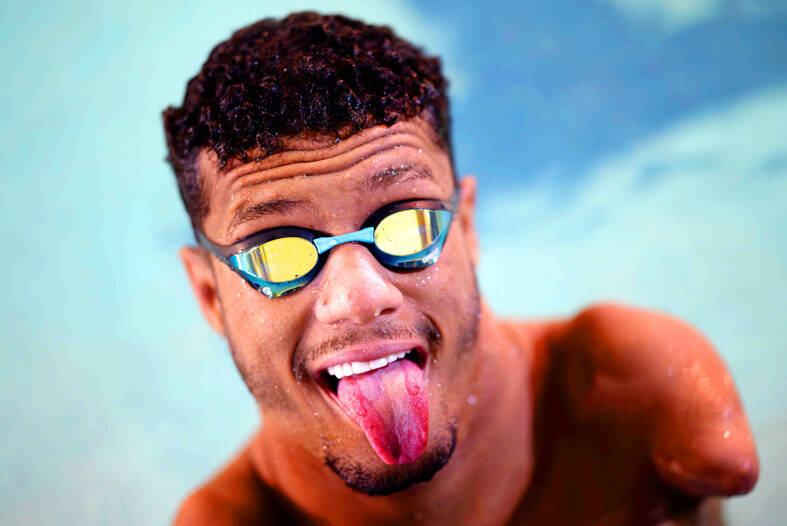
Photo: AFP
When he is not doing laps in the pool at Juiz de Fora, Brazil, Gabrielzinho is nurturing his popularity on Instagram, where he has more than 50,000 followers. As he has no hands or arms, he navigates his phone screen with his toes and uses this same technique to manipulate the joystick on his video game console — his other great passion.
To eat, he bends over to grab the food with his mouth, and then after meals he wedges an electric toothbrush between his toes to clean his teeth.
“I can’t count the number of obstacles I have to overcome every day, but it makes me stronger,” he said.
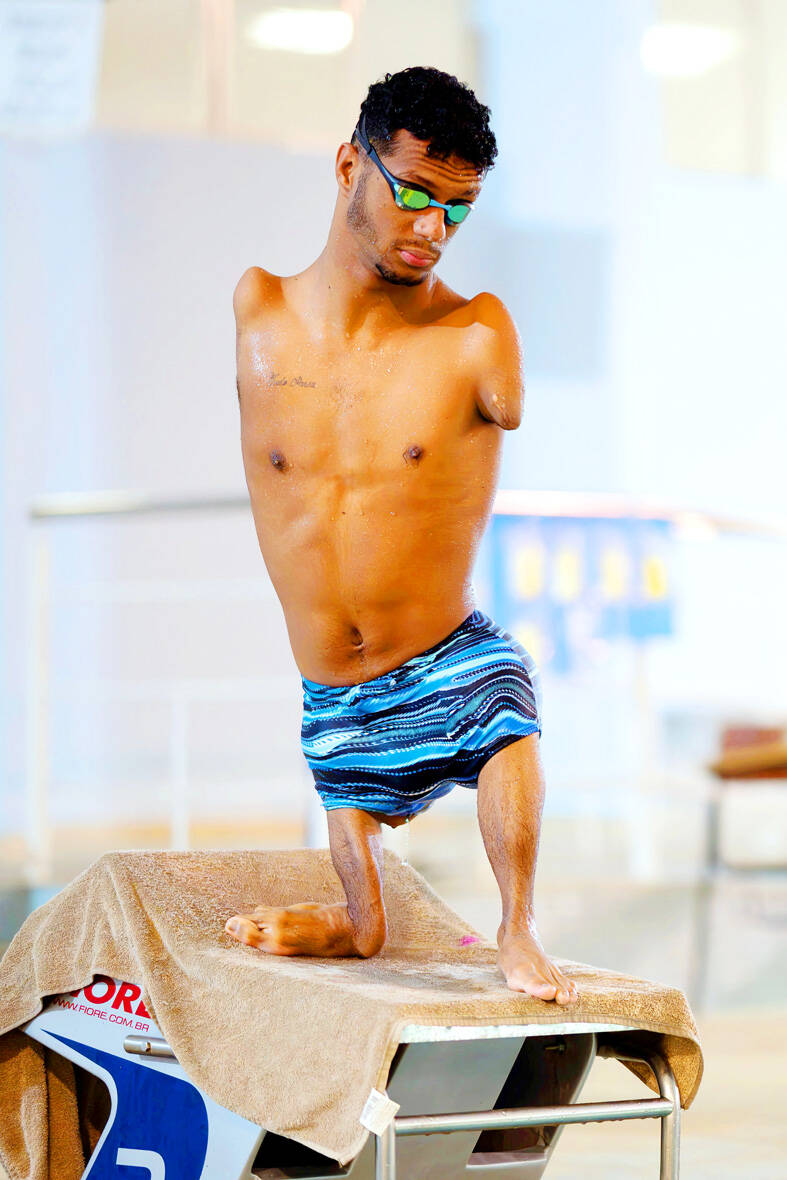
Photo: AFP
His coach Fabio Pereira Antunes said he is a marvel.
“The first thing that impressed me was his dexterity outside the pool. He has great motor coordination and is very intelligent, which enables him to overcome all these obstacles on a daily basis,” Antunes said. “Once I saw him in the water, I discovered all his potential. He has a champion’s mentality and knows how to handle pressure.”
Gabrielzinho has phocomelia, a condition that arrests the development of a baby’s limbs during pregnancy.
The Brazilian has shoulder stumps and his legs are atrophied, but he can walk on both feet.
“I found out in the fifth month of pregnancy. Obviously, it was a shock,” said his mother, Ineida Magda dos Santos, a retired teacher.
“I started reading up on the subject to be ready to take the best possible care of him,” she said.
“Because we wanted him to have a normal childhood, we took him to a club where there was a swimming pool. By the age of four or five, he could already swim, even though he had no arms. I think it was a gift from God,” she said.
To swim, Gabrielzinho undulates in the water like a dolphin, using pelvic movements. A technique developed during long training sessions six times a week, from Monday to Saturday.
In and out of the pool, he performs strength-building exercises, particularly for his lumbar, abdominal and pelvic floor muscles. Gabrielzinho discovered competition at the age of 13, in 2015, at a school tournament.
“A teacher entered him without consulting me, and he won five medals. Since then, he hasn’t stopped,” his mother said.
At 19, he competed at the Tokyo Games, just after learning of the death of his grandfather, nicknamed “Pratinha” (Little Silver), to whom he was very close.
“I was training, I was already in the final phase, and this huge blow came,” Gabrielzinho said.
As if written in the sky, he began his medal haul in Tokyo with a silver in the 100m backstroke S2 — one of the categories for the most severely handicapped swimmers.
“I took it to mean that he was just watching me from the most special place, next to my grandmother, too,” Gabrielzinho said.
He then reached the top of the podium twice, in the 50m backstroke and 200m freestyle S2. Each time, he celebrated with a trademark dance.
The swimmer’s goal in Paris is to defend his two Paralympic titles, “turn his silver medal in the 100m backstroke into gold” and “dance a lot.”
And he would be hoping to exhibit a new celebratory dance to his fans this summer as Gabrielzinho shared that he has come up with a new routine which he is keeping top secret, for the moment.
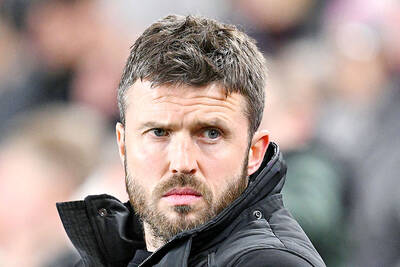
Manchester United on Tuesday confirmed Michael Carrick as interim manager until the end of the season, tasking him with leading the Red Devils back into the UEFA Champions League. “Having the responsibility to lead Manchester United is an honor,” said Carrick, 44, who won 12 major trophies in his 12-year playing career at United. The former midfielder previously had an unbeaten three-game stint as caretaker boss at Old Trafford in 2021. Carrick then took on his first permanent managerial role at second-tier Middlesbrough in October 2022 and was sacked in June last year after the club finished 10th in the
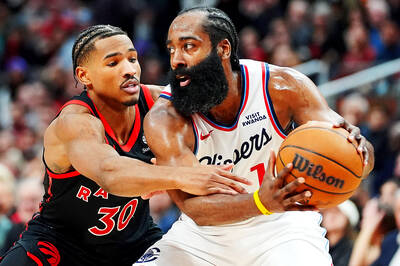
James Harden on Friday scored 31 points and came up big in overtime to help the Los Angeles Clippers erase a double-digit deficit on the way to a 121-117 NBA victory over the Toronto Raptors. Harden scored 16 points in the fourth quarter and overtime as the Clippers pushed their wining steak to five games despite the absence of star Kawhi Leonard with a sprained right ankle. The Clippers trailed by 11 entering the fourth quarter, but Harden drilled a pair of free-throws with 1:24 left in regulation to tie it and after misses from both teams, they went to
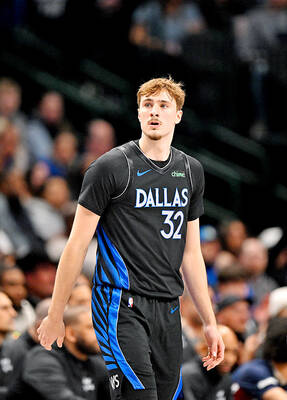
Dallas Mavericks rookie Cooper Flagg on Wednesday was ruled out for the second half of their 118-109 loss to the Denver Nuggets after the No. 1 pick sprained his left ankle in the first half. Flagg was called for a foul while defending against Peyton Watson and turned the ankle as he fell to the floor with 6 minutes, 1 second left in the second quarter. Flagg limped to the bench and continued to the locker room, but returned for the final 2 minutes, 35 seconds before the break. The 19-year-old did not come out for the second half before the announcement that
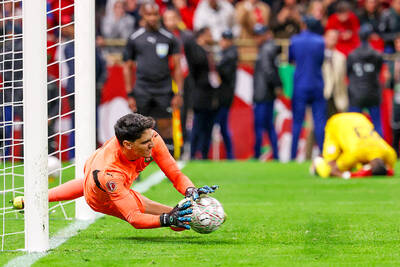
Yassine Bounou on Wednesday saved two penalties, while Youssef en-Nesyri netted the decisive spot-kick as hosts Morocco secured a 4-2 shoot-out victory over Nigeria following a 0-0 draw in a tense Africa Cup of Nations semi-final in Rabat. Morocco, seeking their first continental title in 50 years, are to face 2021 winners Senegal in Sunday’s decider in Rabat, while Nigeria take on Egypt in the third-place playoff tomorrow. The 120 minutes before the shoot-out had few clear-cut chances for either side, but it was Morocco who created more opportunities, although they were denied by some fine saves from Nigeria goalkeeper Stanley Nwabali. Nigeria